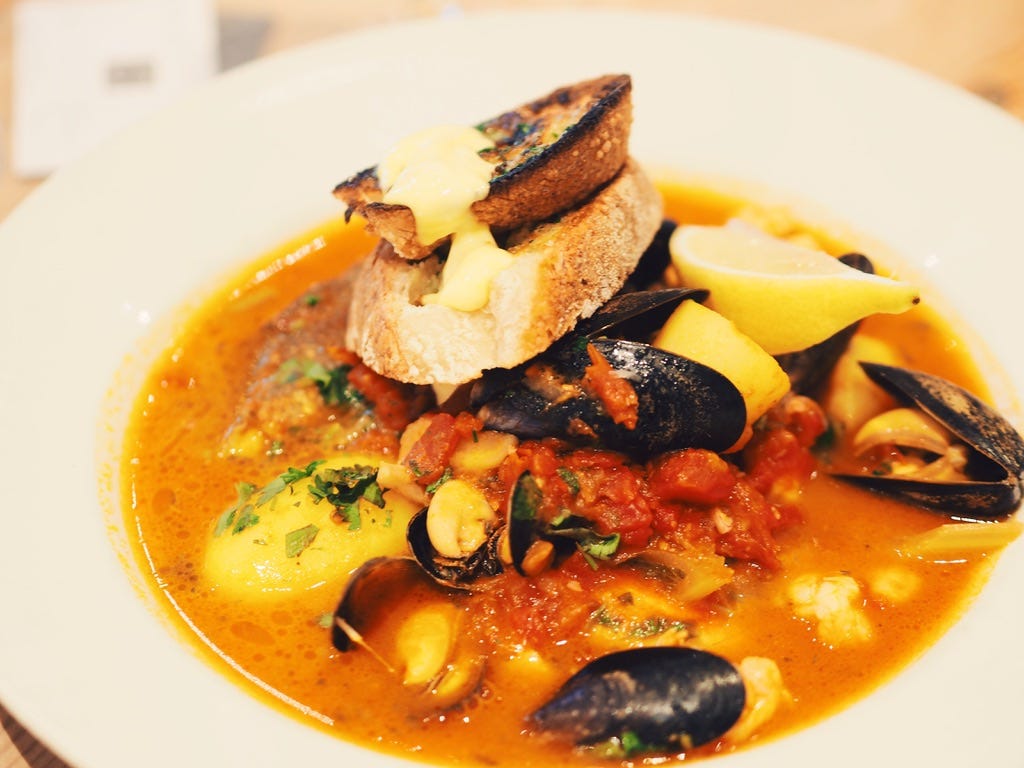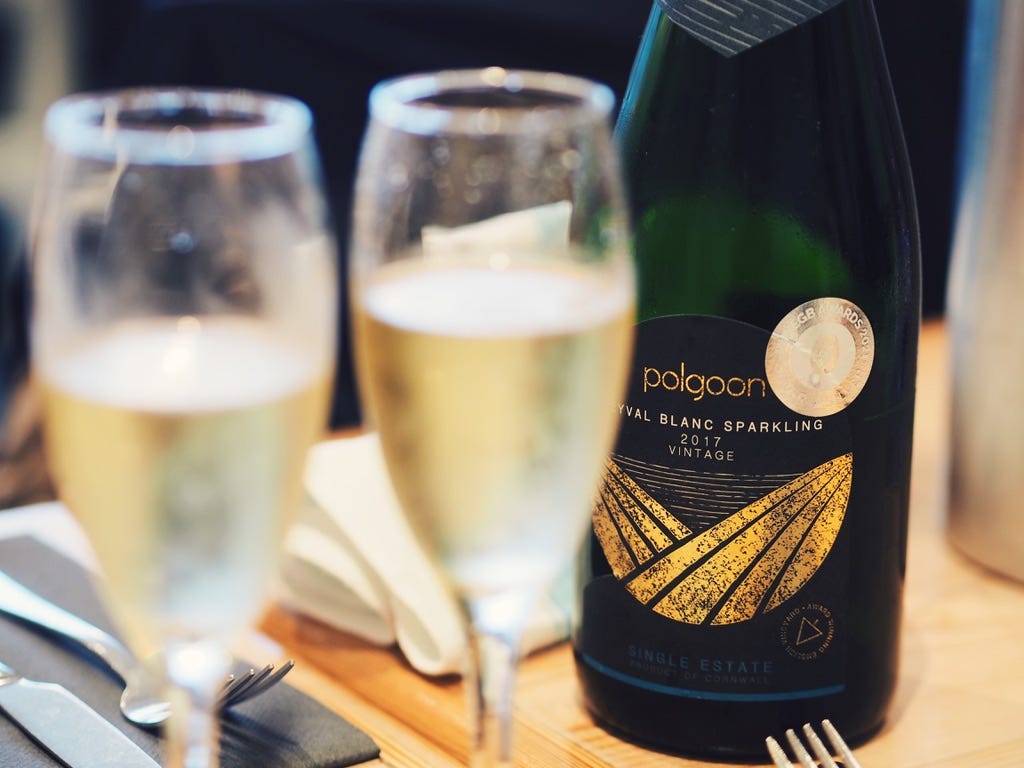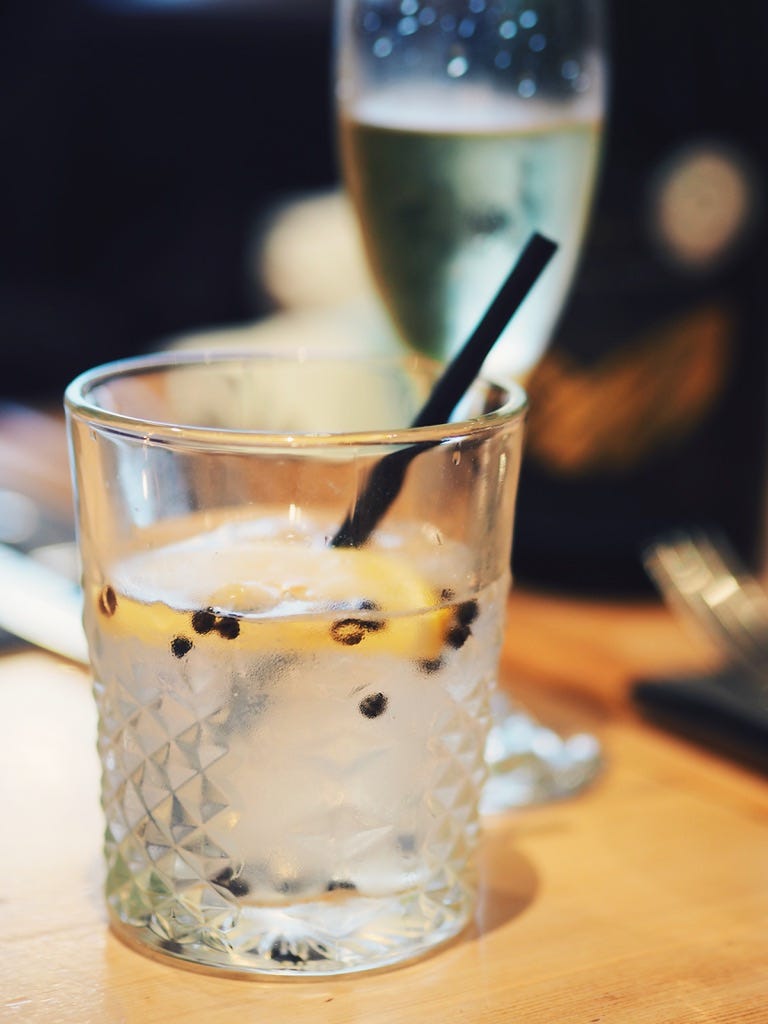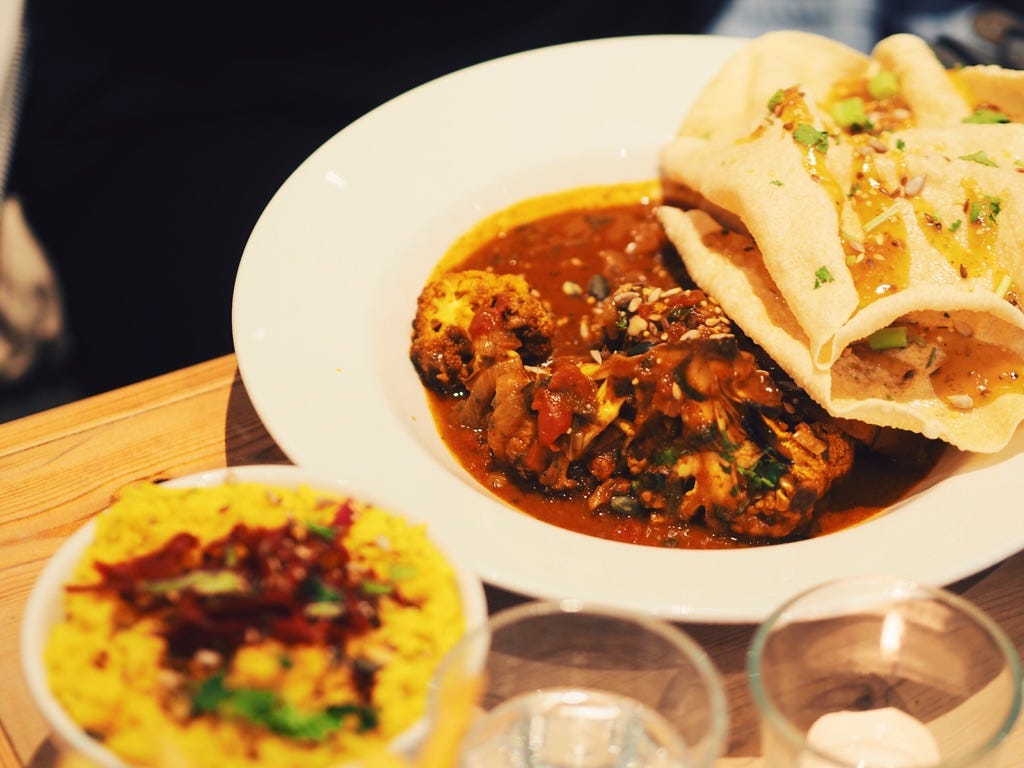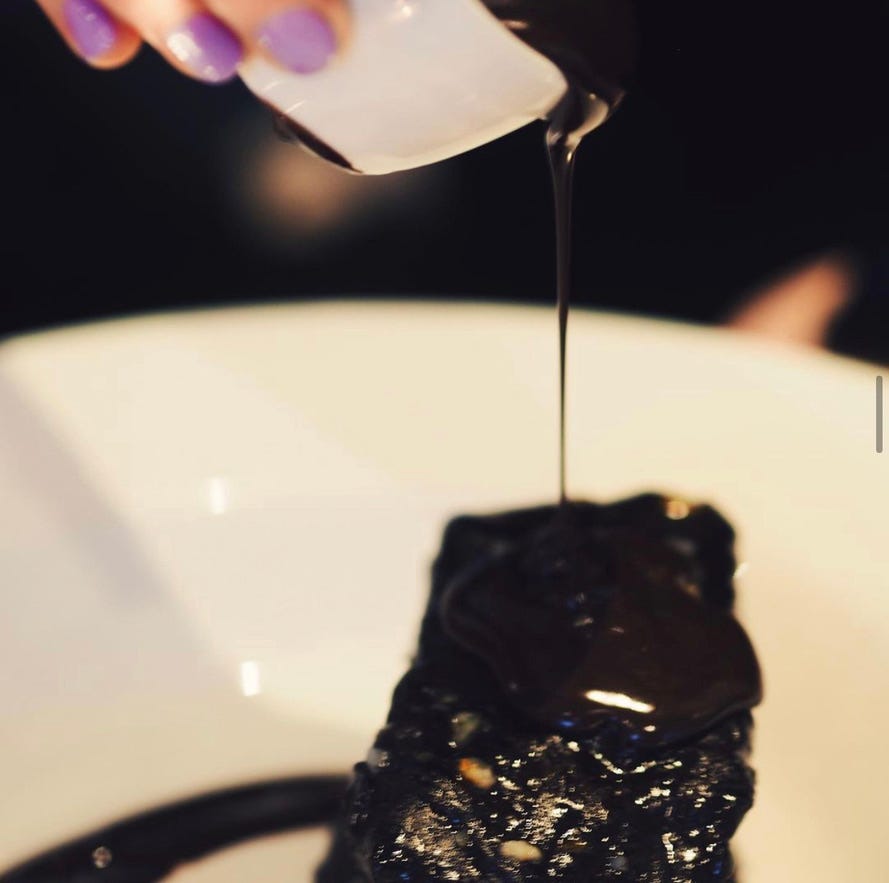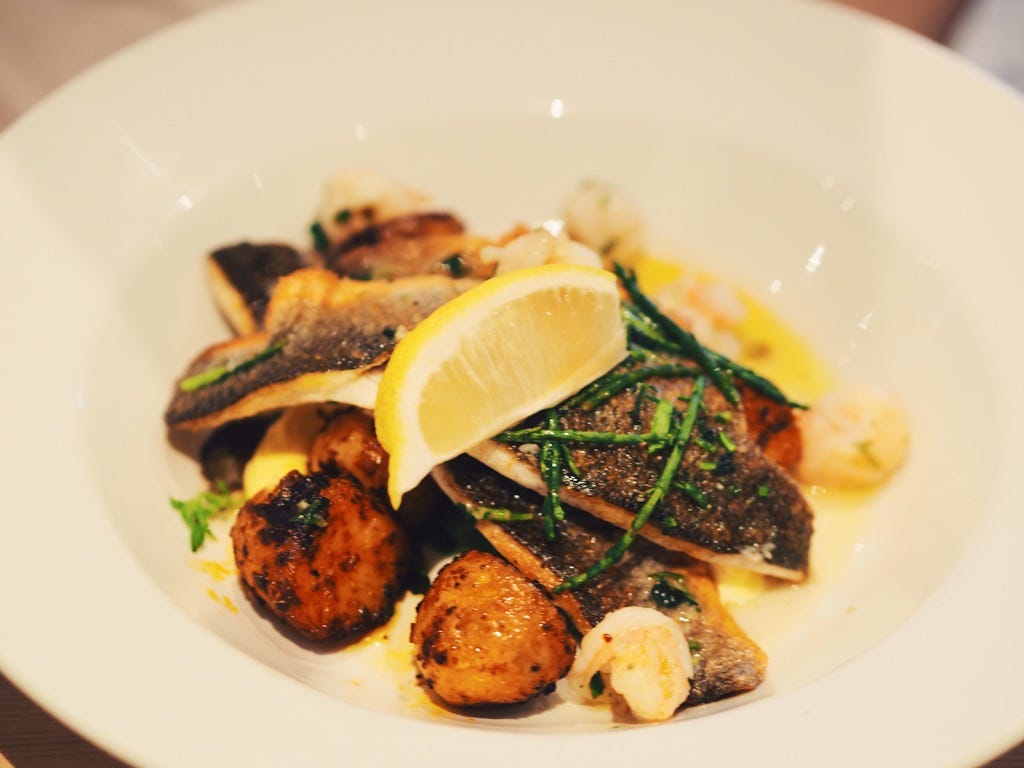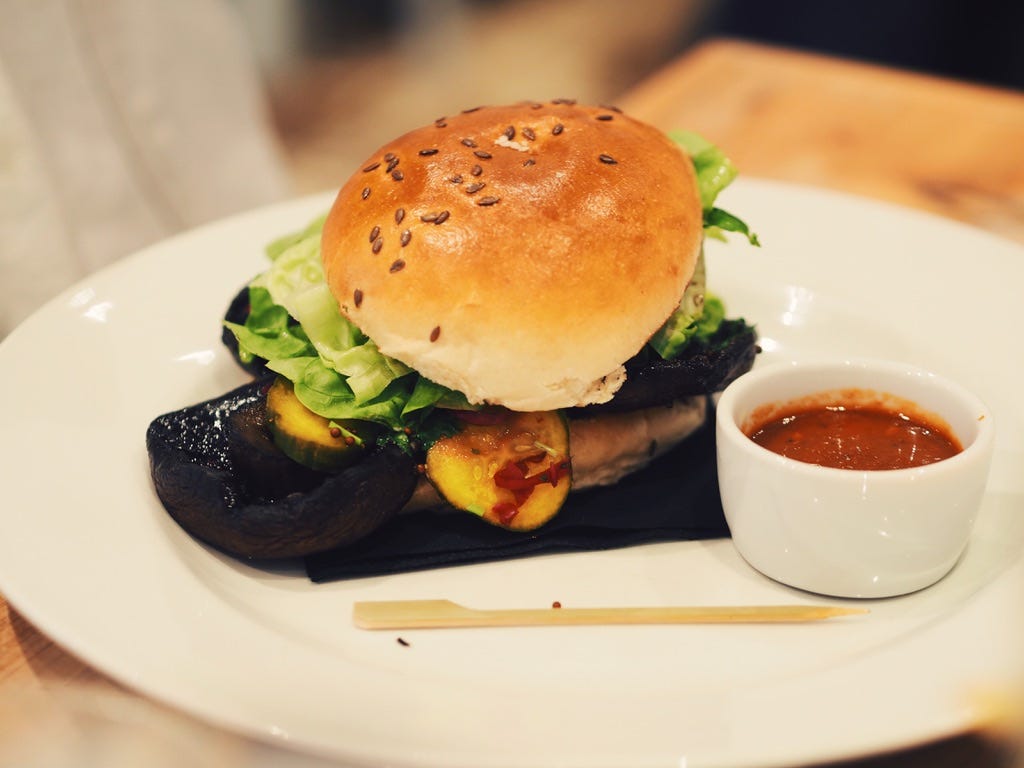It’s a cool, grey evening, and a thin but cutting drizzle of rain blurs Mousehole’s harbour front. The windows of 2 Fore Street are so misted up that the grey of the water merges with the grey of the land and the grey of the sky, which has been darkened prematurely by the heavy clouds. Only the colourful lights strung along the harbour front are visible to the diners within, blurred but bright against the rain.
Having only recently dived through the restaurant’s doorway out of the drizzle myself, I am still shivering like a wet dog, damp and huddled, glad to be wearing a jumper, a cardigan and a raincoat despite it being mid-July. The restaurant has a cool, whitewashed interior, with light wood tabletops, grey painted chairs, and a shabby chic style wooden floor and decorative mirror on one wall. There is nothing special about it, but with the misted up windows and relatively compact setting, it feels both cosy and coastal. It is a Friday night and the small venue is fully booked, most of the diners dressed smartly in light summer clothes in defiance of the midsummer chill.
To quiet my shivering, I turn my attention to the drinks menu, and select a bottle of sparkling wine for the table from the Polgoon vineyard down the road in Penzance, and a gin & tonic made with Tarquin’s “The Seadog” Navy Gin for myself, for good measure. I am pleased to see so many local ingredients and suppliers featuring in both the food and drink menus; bread & pastries from the St Ives Bakery, Cornish blue cheese, Newlyn crab, and the alcohol that shortly enters my bloodstream. No doubt in part it’s a gimmick for the tourists - but then everyone is a tourist here, all hoping for a glimpse of a way of life that now only exists to the extent that it is manufactured for our benefit. Nonetheless, the gin, distilled in northern Cornwall, is a good find; it has a strong juniper flavour, with hints of citrus & pepper which are enhanced by a slice of lemon & several large peppercorns floating in the glass. The Polgoon Seyval Blanc Sparkling ostensibly contains hints of green pear & citrus; to my unrefined tastebuds, it just tastes pleasantly crisp & not too sweet.
Seafood is the heart & soul of the menu, which feels appropriate given Mousehole’s heritage. Like many coastal communities, Mousehole’s story has traditionally been inseparable from the story of the land & sea itself. One of the earliest fishing communities in Cornwall, it has been used as a fishing port since at least the 13th century, and was once a thriving, jostling, overcrowded fishing town. Of course, fishing was never the only story; smugglers made heavy use of the shoreline’s caves over the years, rowing out of the tidal harbour beyond the misted restaurant windows into the channel & exchanging contraband with their French counterparts under cover of darkness. Proximity to the sea brought plenty of other dangers too; in 1595 the Spanish invaded & overran the place, burning to the ground all but one surviving building in a botched attempt at a national invasion.
Beneath the rich heritage that the menu draws from, however, is a less tourist-friendly narrative. The fishing industry has been in decline in Mousehole since the 1970s; only three of the boats in the harbour are active fishing vessels now, the rest are leisure boats. The fishing has moved down the coast to Newlyn, and gone too are the symbiotic secondary industries, like shoemaking. The place primarily exists for tourists and second-homers now, it long having become too expensive for the families who called it home for generations. The restaurant in many ways encapsulates this paradox; it caters to this new influx of Mousehole natives, offering them a taste of what they all flocked here to see - a quaint, historic fishing community which, for all intents and purposes, no longer exists.
That said, the menu’s nod to Cornish culinary heritage is welcome, and the restaurant caters well to a range of dietary requirements beyond fish-eating too. The vegan starter is a rice noodle salad with tamarind, ginger, sesame and toasted seeds. This is well done; it is sharp, tangy, crunchy, crisp. A complex range of flavours comes through — pickled cabbage and cucumbers, citrus, sesame, soy, spring onions, fresh herbs. The textures are equally varied, the crunchy vegetables contrasting with fine slippery noodles. This is followed by a roasted cauliflower saffron masala with pilau rice and seeded poppadom for the main. The dish is aromatic, fragrant, lightly spiced with a touch of heat. The rice in particular is beautifully seasoned, delicately cooked & punctuated with cardamom and fennel, peppercorns & pickled cabbage for added crunch & tang. The popadoms are crisp, salty, and lightly drizzled with mango chutney. Such a meal shakes the cold and the damp from the bones, and I finally relax into the warm, steamed-up restaurant at this point. For dessert, I’m offered a slice of vegan chocolate orange cake with hot chocolate sauce. I’m stuffed, but it’s too good an offer to turn down. It’s delicious - light yet rich & lovely served with the warm sauce. It occurs to me, though, that it is a shame the vegan dishes don’t draw more inspiration from local ingredients in the way the non-vegan meals do; I would have liked to see a bit more Cornish heritage on my plate, the way it was on offer to non-vegan diners. But this too is a paradox; upmarket vegan food is hardly authentic to a rural fishing community. Such food followed people like me. We didn’t follow it.
For the omnivorous members of the my party, the Newlyn crab & parmesan soufflé proves a popular choice for the starter, or alternatively the Cornish blue cheese & walnut variation. Both are light, fluffy, and well balanced; the strong umami flavours coming through from the cheese could easily overpower the delicate crab but they do not. The overall taste is subtle and creamy without being overpowering. Disappointingly, however, the centre of the soufflé is cold; a small but damaging oversight. The specials board offers a glammed up version of sardines on toast as an alternative starter, elevatingly described as ‘grilled butterflied sardines on toast with olive and red pepper tapenade’. This is exactly what it says on the tin - it has a strong flavour, firm and meaty, and doesn’t disappoint. Simple food done well.
For the mains, the seabass is the winning choice. It is perfectly cooked with crispy skin, soft but not chewy, firm but delicate. It is served with garlicky tiger prawns and a creamy sauce but is let down by its potatoes, which are somewhat lacking in flavour. It is a similar story with the bouillabaisse - it is rich, with lots of seasoning coming through (coriander, fennel, aniseed) but the potatoes are flavourless, and taste as though they’ve been reheated or stuck in the microwave.
Overall, the food is tasty, well cooked, well seasoned, and well presented, but is let down by small but noticeable omissions that begin to add up; the cold soufflés, the tasteless potatoes. Such roughness around the edges and failure to keep on top of the basics dulls the sparkle of even the most delectable food, so this is a shame, but it could easily be remedied with a little more care and attention.
Exceptionally full, I put my raincoat back on and waddle out of the warm, steamy restaurant into the dark drizzle. The weather, I concede, is perhaps the last link between the old way of life and the new. The new chases the old, but only succeeds in displacing it. But for all the changes wrought by tourism & gentrification, that cold seeping July rain remains, and whispers of what came before.
—
Currently…
Eating: a lot of experimental homemade ice cream
Enjoying: drinking rosé in shaded pub courtyards - particularly this one




